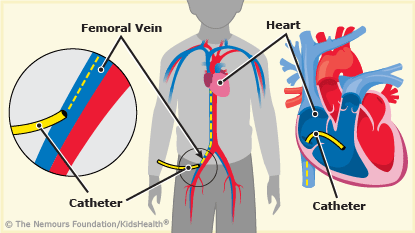Cardiac Catheterization
Article Translations: (Spanish)
What Is Cardiac Catheterization?
Cardiac catheterization (say: kath-uh-tur-ih-ZAY-shun) is a procedure that lets doctors get a better look at a person's heart and blood vessels.
There is almost never any pain involved with a cardiac catheterization. Kids usually sleep through the procedure and go home later that day. Most of them won't even need stitches.
Why Is Cardiac Catheterization Done?
Cardiac catheterizations can help cardiologists (doctors who treat the heart and blood vessels) diagnose and treat many different heart problems.
The procedure may be done on kids to:
- Look at how the heart and blood vessels are formed and connected.
- Check the pressures and oxygen levels in the heart and blood vessels.
- Treat a congenital heart defect (a heart problem that a kid is born with).
- Treat an irregular heartbeat (arrhythmia).
- Open up narrowed blood vessels.
How Should You Prepare for a Cardiac Catheterization?
If you're going to have a cardiac catheterization, your doctor will talk to your parents about any allergies you may have.
Your doctor also will want to know about any medicines you're taking. You might be asked to stop taking some medicines or change how much you're taking for a few days before the cardiac catheterization.
The doctor will probably tell you not to have anything to eat or drink for about 6–8 hours before the procedure. This is to prevent problems from anesthesia, which is a medicine that helps you sleep during the catheterization. Usually, you'll be able to have something to eat and drink soon after.
When it's time to go to the hospital, wear comfortable clothes and remove any jewelry, especially necklaces that could get in the way when they take pictures of your heart.
What Happens During a Cardiac Catheterization?
Here's what to expect during a cardiac catheterization:
- An IV (into a vein) line is put into your arm to give you medicines. A sedative medicine given through the IV lets you sleep during the procedure.
- Small sticky patches (electrodes) placed on your chest will check your heartbeat during the procedure.
- A nurse cleans the area where the catheter will go in (usually the area at the top of the thigh). This area also might be numbed with medicine.
- A small tube about the size of a small straw is put into a blood vessel.
- The catheter goes through the tube, into the blood vessel, and up to the heart. A special type of X-ray lets the cardiologist guide the catheter to where it needs to be.
- The cardiologist does the test or procedure.
- The catheters and tube are removed and a bandage is put over the area.
You're done! Now you'll go to the recovery area, where your parents can join you.

What Happens After a Cardiac Catheterization?
In the recovery room, you'll rest for 4–6 hours while the nursing staff keeps an eye on your progress. You'll have to keep your leg straight for a few hours to prevent it from bleeding.
The doctor will talk to you and your parents about things like:
- when you can eat and drink
- when to remove the bandage
- if you should get up and move if you have a long trip home
- when you can bathe
- when you can return regular activities, school, and sports
What Should I Do at Home?
Your parents will help you take the bandage off, usually the day after the catheterization. Wetting the sticky parts of the bandage will help it come off. Dry the area and put a new bandage over it.
Your parents can help you gently wash the area with soap and water at least once a day and cover it with a new bandage.
For about 2–3 days, you'll take sponge baths. Instead of sitting in the tub, you'll use a wet washcloth to clean yourself. The doctor also might say a short shower is OK. This is so the area where the catheter went in does not get too wet. Avoid baths, hot tubs, and swimming, and do not use any creams, lotions, or ointments on the area.
The doctor will tell you when you can start doing activities again after a cardiac catheterization. After about a week, you should be back to doing all the things you like to do.
Note: All information is for educational purposes only. For specific medical advice, diagnoses, and treatment, consult your doctor.
© 1995-2024 KidsHealth ® All rights reserved. Images provided by iStock, Getty Images, Corbis, Veer, Science Photo Library, Science Source Images, Shutterstock, and Clipart.com

